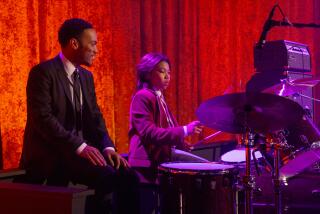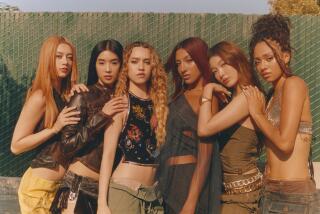Commercial bond between bands and brands is deepening
Pop star Katy Perry, whose stage garb has included a bra that shoots whipped cream, is not generally known as the less-is-more type.
Yet last year she picked an understated approach to promote the rollout of her current world tour: a television commercial for Citigroup. The spot depicted a girl excitedly asking her father to buy concert tickets.
It might seem like an odd paring. But the commercial led to further collaboration between the financial services giant and Perry, including a recent acoustic performance at the Hollywood Bowl open only to Citi cardholders and a branded backstage lounge in each city the tour visits.
“I’d call it a partnership,” said Steven Jensen, who helps oversee Perry’s career along with his partners at Los Angeles-based Direct Management Group. “It felt creative and organic. It hooked us.”
Theirs isn’t the only such bond.
Years after corporations began enlisting musicians as spokesmen, the alliance between brands and bands is deepening, with companies from outside the music world taking on creative and curatorial roles at a moment when record labels are ceding some of their authority.
The critically acclaimed metal band Deafheaven stopped at Echo Park’s Echoplex in October on a tour booked by the shoemaker Converse, which also invited local acts to apply for free recording time at a downtown studio.
And Red Bull just wrapped an event called 30 Days in L.A., in which the energy drink company put on a different concert every night in November. Many gigs paired established acts (such as Cut Copy and Run the Jewels) with smaller outfits involved in Red Bull Sound Select, a program designed to identify and assist emerging talent.
Countless other brands, from clothing labels to fast-food chains, are increasingly visible at industry events like the annual South by Southwest conference in Austin, Texas, where this year a panel discussion (with executives from Corona and Under Armour) eagerly took up a telling question: “Are brands the new music tastemakers?”
Corporations are aligning with pop stars in part for the same reason they always have: to enjoy a bit of their reflected cool. Yet music seems to have become a more integrated component of some companies’ marketing strategies.
Jennifer Breithaupt, senior vice president of entertainment marketing at Citi, said that the bank’s Private Pass program — which has presented exclusive gigs by the likes of John Legend and Coldplay — helps the company’s customers “build an emotional connection.” It also helps that many people use their credit or debit cards to buy concert tickets.
“Our focus is about creating these once-in-a-lifetime experiences where they can interact with their favorite artist,” she said. For an example, she pointed to a recent dinner at L.A.’s Avalon nightclub where each song on the latest album by the country trio Rascal Flatts was paired with a different wine; after the meal, the group performed for an audience far smaller than its usual crowd.
Converse’s director of music marketing, Jed Lewis, echoed Breithaupt when he said that his company — whose Rubber Tracks program offers studio resources to little-known bands — fits naturally in the music scene.
“We’re lucky to have been on the feet of so many musicians,” he said in reference to Converse’s recognizable Chuck Taylor sneakers. Rubber Tracks, he added, was conceived as the company’s way “to give something back” — and, no doubt, to ensure that tomorrow’s hit makers continue to wear its shoes.
For artists, these partnerships offer a variety of benefits, not least the old-fashioned promotional push that’s still valuable to a social-media star like Perry, who can (and does) hype herself tirelessly on Twitter and Facebook.
“We want people to think about Katy,” said her manager Jensen. “If partnering with a brand can help perpetuate that, we do it.”
Increasingly, though, brands are wooing artists with the kind of assistance that labels once provided before online piracy (and then the shift to cheap digital streaming) cut dramatically into their profits.
“Red Bull took on the artist development that used to exist at labels,” said Thurz, a young rapper from Inglewood whose participation in Red Bull Sound Select got him onto a bill with Run the Jewels last month at the Echoplex. The company, Thurz said, has funded recording sessions and connected him with producers. “They’re filling that void.”
Even top-level artists — superstars no longer in the business of development — are looking for help. At SXSW in March, Lady Gaga teamed with Doritos for a lavish performance that she later implied her label couldn’t have afforded to put on.
Singer Damian Kulash, whose L.A.-based band OK Go has sought various corporate partners to underwrite a series of widely viewed music videos, said he’s found more creative freedom and financial transparency working with brands than he did while signed to a music company.
“What State Farm wanted from us was laid out clearly,” he said, referring to the insurance firm that funded the band’s clip for “This Too Shall Pass,” which has been viewed nearly 50 million times on YouTube. “They wanted a three-second logo at the end of the video and a red element throughout. That’s it. You don’t get that clarity from a record label.”
Word of that relatively hands-off approach has helped boost musicians’ appetites for collaborating with brands, an act viewed much more suspiciously (for fear that it looked like selling out) as recently as a decade ago.
And that in turn, said Jensen, has lowered resistance among consumers toward this kind of touchy-feely marketing.
“We’ve gotten away from the hippie era where anything corporate was bad,” he said. “The younger generation has grown up with these brands — they’re part of their everyday lives.
“Today it’s not a turn-off to fans that artists and brands are collaborating this way. It’s not even a surprise.”
Twitter: @mikaelwood
More to Read
From the Oscars to the Emmys.
Get the Envelope newsletter for exclusive awards season coverage, behind-the-scenes stories from the Envelope podcast and columnist Glenn Whipp’s must-read analysis.
You may occasionally receive promotional content from the Los Angeles Times.











